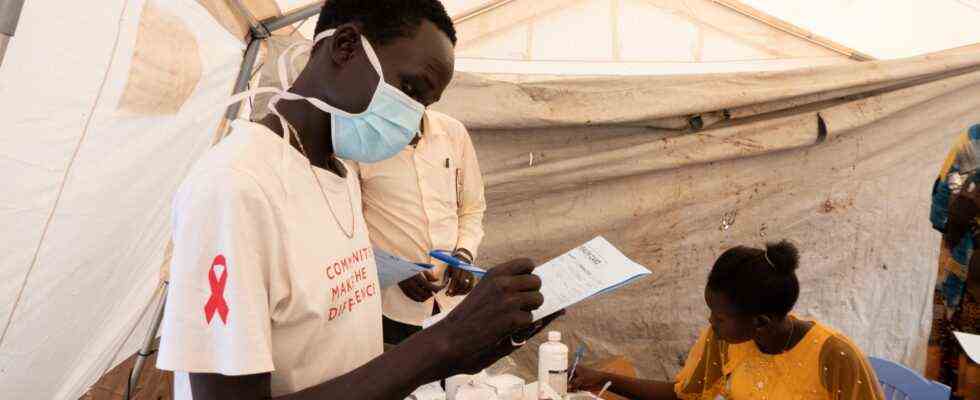Status: December 21, 2021 4:46 p.m.
When the aid organization “Doctors Without Borders” celebrates the 50th anniversary of its existence, many worries are mixed with joy. Because the growth of the organization always shows how there are many crises worldwide.
“Medicines shouldn’t be a luxury,” said a poster from “Doctors Without Borders” from 2014. What you can see is a shiny golden finger ring – instead of a precious stone, the piece of jewelry has a banal white tablet emblazoned on it. Next to it is a poster from 2019 – the same picture five years later, the same tablet ring – with the slightly corrected message: “Medicines should still not be a luxury.”
The posters hang in a gallery in Geneva. “Looking back on 50 years of humanity” is the title of the exhibition, compiled by Francoise Duroch, head of the research department at “Doctors Without Borders”, on the occasion of the aid organization’s 50th birthday.
“I don’t know if there is anything to celebrate,” she says, “in view of the global crises and ever new humanitarian emergencies. But at least we are now an organization that can do more than in 1971. Back then we were hardly more than ten people. Today we are more than 60,000 in several dozen countries. We now have significantly more capacity for our missions. “
Help and inform
These missions have had the same goal for 50 years: medical humanitarian aid for people in need. And, what was important from the start: “Doctors Without Borders” was always about reporting independently on the situation of people in the crisis regions.
Not only doctors but also journalists were among the founding members in Paris in 1971. They were directly shaped by the Biafra war in Nigeria; a brutal Cold War conflict that involved numerous states and which led to a catastrophic hunger crisis.
“You can and must help, that is clear,” emphasizes Duroch. “But when does a situation become unacceptable? Shouldn’t one withdraw at some point and denounce the riots and violations of the law? This dilemma has been with MSF for five decades.”
Christian Katzer, “Doctors Without Borders”, on the 50th anniversary of the humanitarian organization
tagesschau24 12:00 p.m., 21.12.2021
Dispute over the Nobel Peace Prize
There were also heated debates in 1999 when the aid organization was awarded the Nobel Peace Prize. Would the independent and uncompromising humanitarian aid workers be co-opted, institutionalized, and possibly instrumentalized by accepting the award? There was a lot of arguments back then, and fundamentally, says Duroch.
Eventually the award was accepted – out of pragmatism. To make the organization more visible, to get more funds for our work on site. I don’t know whether it would be wise to accept the Nobel Peace Prize today, if you see who has won it over the past ten years. It’s very difficult to say whether we did it right then. It was a pragmatic decision. ”
A signal and a wake-up call
Doctors Without Borders are now also working in places that the founding generation would not have thought possible 50 years ago: help must be in the middle of Europe – people freezing to death on the Polish border, people in need on Greek islands, people drowning in the Mediterranean.
The Jet d’Eau – the famous water fountain on Lake Geneva – is to be illuminated in red today for the birthday of Doctors Without Borders. A blood-red jet of water as a signal and a wake-up call.
“So that we can think about these crises,” says Francoise Duroch. “How is it that we in Europe are confronted with a migration crisis in the middle of winter in 2021? If our anniversary gives rise to exchange and discussion, then that wouldn’t be so bad at all.”
50 years of Doctors Without Borders – party mood with limits
Kathrin Hondl, ARD Geneva, December 21, 2021 10:07 a.m.

